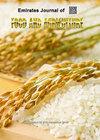Potential anticancer activity of chemically characterized extract of Olea europaea (Olive) leaves
IF 0.7
4区 农林科学
Q3 AGRONOMY
引用次数: 1
Abstract
Olea europaea Linn. (Olive) is considered as essential component of Mediterranean diets. Olive leaves, fruits, and oil are traditionally known for several health benefits including diabetes, cardiac complications, cancer, etc. The objective of the present study is to determine the anticancer potential of chemically characterized O. europaea extract in MTT assay and EB/AO double staining method using Human lung cancer cell lines (A549). The chemical constituents present in the ethyl acetate extract of O. europaea leaves were characterized by GC-MS and its cytotoxic activity was assessed by MTT assay and EB/AO double staining method. The GC-MS analysis identified 63 chemical constituents, and neophytadiene (21.80%), zingiberenol (12.36%), and allohimachalol (5.49%) was found as major chemical constituents in ethyl acetate extract of O. europaea leaves. O. europaea produces a time and dose-dependent inhibition of cell proliferation of A549 cell lines. The cell viability of A549 cell lines after 24 hrs treatment with O. europaea ranged from 97.96±3.44 to 18.95±2.14 % for a concentration range of 0.5-500 μg/mL, respectively, with IC50 value of 21.91±1.8 μg/mL. EB/AO double staining shows significant apoptosis in early and late apoptotic, and necrotic cells with increased volume and showed uneven orange-red fluorescence at their periphery. The study outcome shows that O. europaea extract significantly inhibited cell proliferation and apoptosis in human lung cancer (A549) cell lines, and it also explores the chemical composition of O. europaea leaves extract. Keywords: Apoptosis, A549 cell lines, Cancer, GC-MS, MTT assay, Olea europea, Olive.油橄榄叶化学特征提取物的潜在抗癌活性
油橄榄。(橄榄)被认为是地中海饮食的重要组成部分。传统上,橄榄叶、水果和橄榄油对健康有多种益处,包括糖尿病、心脏并发症、癌症等。以肺癌细胞株A549为实验对象,采用MTT法和EB/AO双染色法研究了木香提取物的抗癌作用。采用气相色谱-质谱法(GC-MS)对欧花叶乙酸乙酯提取物的化学成分进行了表征,并采用MTT法和EB/AO双染色法对其细胞毒活性进行了评价。气相色谱-质谱分析共鉴定出63种化学成分,其中新叶二烯(21.80%)、姜烯醇(12.36%)和别柳马草醇(5.49%)为主要化学成分。木香草对A549细胞株的增殖具有时间和剂量依赖性的抑制作用。在0.5 ~ 500 μg/mL浓度范围内,对A549细胞株处理24 h后,细胞存活率为97.96±3.44 ~ 18.95±2.14%,IC50值为21.91±1.8 μg/mL。EB/AO双染色显示早期和晚期凋亡细胞明显凋亡,坏死细胞体积增大,周围橙红色荧光不均匀。研究结果表明,木香叶提取物对人肺癌(A549)细胞株的细胞增殖和凋亡有明显的抑制作用,并对木香叶提取物的化学成分进行了探讨。
关键词:凋亡,A549细胞系,癌症,气相色谱-质谱,MTT法,欧洲油橄榄,橄榄;& # x0D;
本文章由计算机程序翻译,如有差异,请以英文原文为准。
求助全文
约1分钟内获得全文
求助全文
来源期刊

Emirates Journal of Food and Agriculture
AGRONOMYFOOD SCIENCE & TECHNOLOGY&nb-FOOD SCIENCE & TECHNOLOGY
CiteScore
1.80
自引率
0.00%
发文量
18
期刊介绍:
The "Emirates Journal of Food and Agriculture [EJFA]" is a unique, peer-reviewed Journal of Food and Agriculture publishing basic and applied research articles in the field of agricultural and food sciences by the College of Food and Agriculture, United Arab Emirates University, United Arab Emirates.
 求助内容:
求助内容: 应助结果提醒方式:
应助结果提醒方式:


